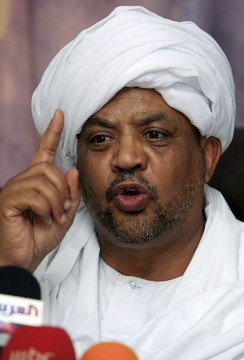Opposition forces don’t have viable alternative to Bashir’s regime, says PCP
July 9, 2014 (KHARTOUM) – Sudan’s Popular Congress Party (PCP) led by Hassan al-Turabi has accused opposition forces who seek to overthrow the regime of not having a viable alternative to lead the country.

Abdel-Salam, who spoke in a forum at the government-sponsored National Center for Media Production (NCMP), said the ongoing dialogue is the only means for finding a way out of the country’s entrenched crises.
The PCP, which share the same Islamic origins with the ruling National Congress Party (NCP), is the only big opposition party to stick to the dialogue process as the National Umma Party asks to review it in a way to include rebel groups and left opposition parties.
However, the PCP political secretary criticised the government unilateral move to pass the amendments on the electoral law, saying the amendments should have been discussed on the dialogue’s table.
The Sudanese parliament last week passed amendments to the 2008 elections law amid accusations by opposition that the government plans to rig the election process through the new law.
He described the approval of the electoral law as “incorrect move”, saying these amendments need the agreement of all political forces.
The PCP official underscored that amendments to electoral law are closely linked to amendments on laws restricting freedoms, denying his party submitted written views to the parliament on these amendments.
Last week, the speaker of the Sudanese parliament al-Fatih Izz al-Din disclosed that he had received a written proposal from the leader of the PCP Hassan al-Turabi on the election law.
Abdel-Salam called for raising the participation rate of women in order for them to be equal with men, saying amendments which were made to the law are not sufficient for guaranteeing integrity of elections.
He stressed importance for delinking the ruling NCP from the state.
Under the amended law, the percentage of proportional representation according to the draft bill went up from 40% to 50% with an increase in the minimum allocated for women from 25% to 30% and for the party representation list from 15% to 20%.
The amended law also stated that members of uniformed forces will be able to cast their ballots without being restricted to the three months period requirement of residency in the constituency.
DUP CRITICAL
Meanwhile, the leading figure at the Democratic Unionist Party (DUP), Ali Alsayed, said his party was forced to participate in the dialogue, accusing the government of appointing the cabinet minister, Ahmed Saad Omer, as the DUP’s delegate in the dialogue mechanism.
Alsayed, who spoke at the same forum, said his party’s representative in the mechanism is Bukhari al-Gaali, adding that they are reconsidering their participation in the dialogue and the government.
He described the national dialogue as “worthless”, adding the government insistence on holding the dialogue in her own way would take the country back to square one.
The DUP figure also accused the NCP of deceiving the political forces through the national dialogue, saying the ruling party is not ready to relinquish power.
He said they were surprised by the electoral law amendments, noting these amendments must be agreed upon by all political forces.
Al-Sayed further underscored that holding elections as scheduled would only mean continuation of the same regime, saying this will exacerbate the country’s crises.
The DUP left opposition ranks and joined the broad-based government of the NCP in December 2011, citing the “need to save the country” in the words of its leader, Mohamed Osman al-Mirghani.
The decision of one of Sudan’s biggest opposition parties to join the government has created a great deal of internal dissent that saw many members quitting in protest.
(ST)
